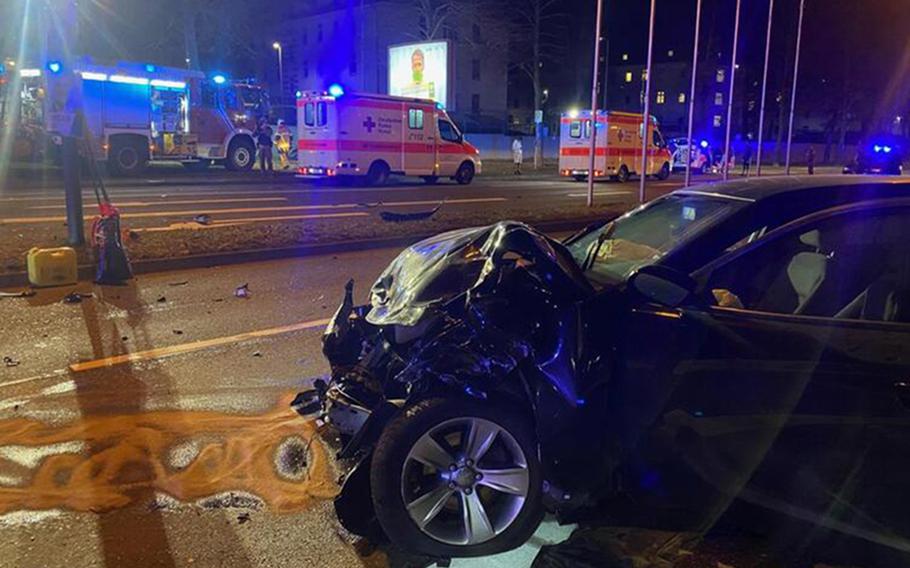
The U.S. Army Court of Criminal Appeals upheld Pvt. Trevon Coley’s 2022 conviction on involuntary manslaughter and aggravated assault charges in the death of Sgt. Monesha Burton, who was killed in a high-speed crash caused by Coley in Kaiserslautern, Germany, in 2021. (Kaiserslautern fire department)
KAISERSLAUTERN, Germany — A U.S. soldier serving eight years in prison for killing another soldier in a high-speed crash in Kaiserslautern three years ago has lost his first appeal in military court.
The U.S. Army Court of Criminal Appeals upheld Pvt. Trevon K. Coley’s 2022 conviction of involuntary manslaughter and aggravated assault for the death of Sgt. Monesha L. Burton.
In a 3-0 ruling last month, the appellate judges denied Coley’s challenge on five separate claims.
On the evening of March 5, 2021, Coley and two other soldiers were driving to their barracks. They were speeding and weaving their way around traffic, according to court documents.
Coley, in the lead, was driving 107 mph, seconds before he collided with Burton’s Ford Fusion at an intersection near Daenner Kaserne and Kleber Kaserne. Coley’s Dodge Charger was estimated to be going 68 mph when the cars made contact, according to court testimony.

Sgt. Monesha L. Burton died in a two-car traffic accident in Kaiserslautern, Germany, March 5, 2021. The U.S. Army Court of Criminal Appeals upheld Pvt. Trevon K. Coley’s 2022 conviction on involuntary manslaughter and aggravated assault charges for Burton's death. (Russell Toof)
The speed limit at the intersection was 50 kilometers per hour, or 31 mph.
Pfc. Quiera M. Jackson, a passenger in Burton’s car, sustained serious injuries in the wreck.
Coley, who was driving without a valid license, tried to get his girlfriend to cover for him and say she was driving the car that collided with Burton.
In his appeal, Coley maintained at his court-martial that military judge Lt. Col. Lance Smith should have provided language that would have allowed the jury to consider Burton’s driving conduct on the night of the wreck, an error that denied him a fair trial.
The evidence at trial, the appellate judges noted, centered on Coley’s excessive speed through an otherwise busy intersection at night and whether Burton used “reasonable care,” in light of defense assertions that she rolled through the stop sign at the intersection.
The appeals court ultimately ruled that it didn’t matter if the military judge erred or whether the defense’s characterization of Burton’s driving was accurate.
“The evidence supporting appellant’s guilt was overwhelming,” the appeals judges wrote in their opinion. “Any assumed fault (by Burton) was miniscule in comparison to the appellant driving 107 miles per hour into an intersection with obstructed lighting and visibility.
“We have no doubt that the panel members would have found appellant guilty” even with the additional instruction by the judge, the ruling stated.
The appeals found no evidence to support Coley’s assertion that his defense team was ineffective for failing to interview the medical professionals who treated Burton at the crash scene.
The court also denied Coley’s claim of unlawful command influence, which stemmed from the original judge, Col. Charles Pritchard, recusing himself from the case.
Pritchard stepped away after ruling in January 2022 that the accused in a separate case had a constitutional right to a unanimous verdict. Pritchard said he did not want to decide any unanimous verdict motions until the higher courts weighed in.
That issue stalled when the Supreme Court in February declined to hear two cases challenging the constitutionality of split-jury verdicts in military court.